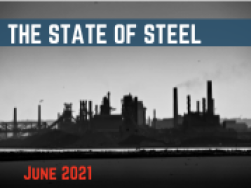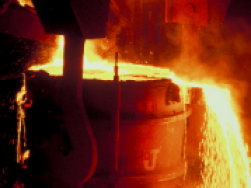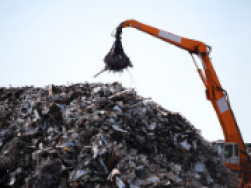State of Steel - June 2021
Pricing
Steel prices continue to rise through June. With a continued weak supply of coil and an increased cost in scrap and trucking, it is causing a real disruption in both pricing and lead times. As of the third week of June, the steel pricing index known at the CRU has now increased 44 weeks in a row. The CRU index has seen a 117% increase in the steel index since the first week of December and a 174% increase since the first week of October 2020. This marks the 10th month in a row that the CRU index has increased. Nucor Tubular and Atlas Tube (the two largest structural tubing mills) have once again raised prices on HSS, pipe, mechanical, and piling products by another $125/ton earlier this month. All other structural tubing mills have followed suit. This kicks off the 16th round of price increases since August. With regards to DOM, most mill pricing has increased 10 times for a total of 67-70% overall since the beginning of October 2020. The below charts reflect a current listing of all price increases on tubing that we have seen since late August of 2020.
Rebar prices increased again this week as the market continued to accept the most recent round of price increases. Fastmarkets’ assessment for steel rebar was $880/ton. (Source: AMM). The Midwest aluminum premium increased to another all-time high this week, with Fastmarkets assessing the Midwest aluminum premium at $0.27-$0.28/pound. According to market participants, the increase can be attributed to strong demand, tight supply, rising freight costs, and increasing premiums globally. (Source: AMM) Nucor, Gerdau and Deacero have all raised prices for most merchant products by $70/ton, effective immediately. (Source: AMM) Steel plate prices in the US increased this week, with Fastmarkets' price assessment for steel cut-to-length plate carbon grade, fob mill US increasing to $1,390/ton, which is the highest level since the fall of 2008 (Source: AMM)


Pricing on all continuous cast iron products continues to climb. This can be attributed to higher raw material surcharges, base price increases, and an increased cost of freight. Base prices increased in February and we have now been informed of a significant base price increase on all orders starting July 1st, 2021. The below chart details the Dura-Bar surcharges over the last year or so.

Lead Times
Understanding lead times for steel products are important to every participant in the supply chain. Lead times for steel products are as follows (as of 6/17/21):
HRC lead times declined this week to 8.3 weeks versus an average of ~5.5 weeks since 2016. Other product lead times were mixed this week with CRC lead times at 9.9 weeks, HDG lead times at 11.4 weeks, and plate lead times at 9.1 weeks. (Source: Platts)
DOM Tubing is anywhere from 25-34 weeks given the availability of raw steel coils and orders already on the books.
Structural Tubing mill lead times are running approximately 10-14 weeks upon receipt of order.
Dura-Bar Continuous Cast Iron mill lead times are approximately 3-8 weeks depending on size and grade.
Metal Production
In the week ended June 5, US raw steel production increased 0.2% week-over-week to 1.84mt (+46.3% YoY). US capacity utilization was 82.3% vs 56.2% last year. This was the highest capacity utilization since the pandemic began. Year-to-date production is 39,546,000 net tons up 12.1% year-over-year from 35,292,000 net tons last year. (Source: AISI)
Evraz's EAF (electric arc furnace) mill in Pueblo, Colorado, which was damaged by an explosion on May 29, is expected to restart the week of June 21. The rolling mill remains operational with Evraz purchasing billets to meet customer orders. (Source: AMM)
Scrap
Detroit mills started the June scrap trade by offering to buy shredded scrap at price increases of up $50/ton month-over-month and prime scrap at price increases of up $60/ton month-over-month. This would be the first increase in prime scrap prices since March. (Source: AMM)
Regional scrap markets followed Detroit's lead with prices having settled up at $60 per gross ton on prime grades and up $50 per gross ton on obsoletes. Market participants expect scrap to trade sideways in July. (Source: SMU)






